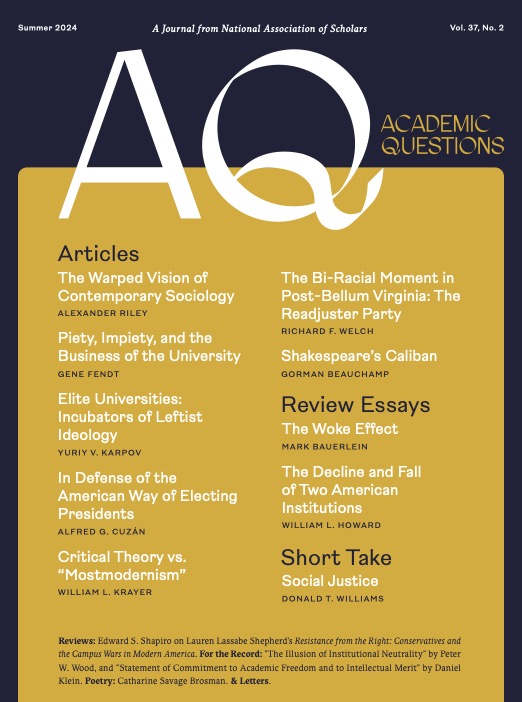ARTICLES
The Warped Vision of Contemporary Sociology
Alexander Riley, Bucknell University.
The decline of sociology as an academic discipline has been unfolding in plain sight as ideologues colonize departments and repurpose scholarship in the service of radical political goals. A series of short videos available on the website of the American Sociological Association shows just how “hair-raising” this process has become.
Piety, Impiety, and the Business of the University
Gene Fendt, University of Nebraska, Kearney.
Despite the origins of the university in religious learning, it seems out of bounds these days to ask about the relation of the university to piety. Philosopher Gene Fendt holds that if your institution is not seriously wrestling with questions of belief and epistemological authority, you may want to reconsider your involvement.
Elite Universities: Incubators of Leftist Ideology
Yuriy V. Karpov, Touro University.
Through the conveyance of its graduates into influential positions in corporations, state bureaucracies, and the media, elite universities propagate leftist ideas throughout American life.
In Defense of the American Way of Electing Presidents
Alfred G. Cuzán, University of West Florida.
The Electoral College is a phrase used to describe the process for electing the president by states. Thus, it is an indispensable part of our “republic of states,” protects checks and balances and the federal distribution of power, making clean and orderly elections possible.
Critical Theory vs. “Mostmodernism”
William L. Krayer
By defining knowledge and technology as weapons of privatization, domination, and violence, critical theorists seem intent on depriving mankind the benefits of self-interested innovation. In fact, continuous improvements in science and technology are vital for human progress.
The Bi-Racial Moment in Post-Bellum Virginia: The Readjuster Party
Richard F. Welch, Long Island University, Farmingdale State College.
While you wouldn’t know it from reading the 1619 Project and most U.S. historians, there have been historical occasions in which whites and blacks sought to form coalitions and work for change. The Readjuster Party that arose in Virginia in the late 1870s is one such instance.
Shakespeare’s Caliban
Gorman Beauchamp, University of Michigan.
Shakespeare’s play The Tempest has become a tool for activists of the current political zeitgeist. The purveyors of anti-colonialist ideology have reoriented the play, with alterations and “adaptations” to suit. But there is only one Caliban, says Gorman Beauchamp, the one in Shakespeare’s play.
REVIEW ESSAYS
The Woke Effect
Mark Bauerlein, Emory University.
Mark Bauerlein dissects the attempts of two celebrated conservative authors to trace the origins and implications of the “woke” revolution. Bauerlein concludes that the insights provided by both authors—Richard Hanania and Christopher Rufo—have made it impossible for Americans to ever again accept movements such as Black Lives Matter as morally worthy, or to confuse revolution for mere reform.
The Decline and Fall of Two American Institutions
William L. Howard, Chicago State University (ret.).
Two books by well-known pundits analyze the descent of two American institutions widely believed to be responsible for the rapid and radical deformation of American culture: the Democrat Party and higher education.
SHORT TAKE
Social Justice?
Donald T. Williams, Toccoa Falls College.
Here are four good reasons the term “social justice” ought to be banned from our vocabulary and never heard again.
FOR THE RECORD
The Illusion of Institutional Neutrality
Peter Wood, National Association of Scholars.
The necessity for colleges and universities to vigorously espouse the substantive ideals of truth, liberty, and citizenship makes institutional neutrality untenable in higher education. For this and several other reasons, writes Peter Wood, president of the National Association of Scholars, the NAS opposes institutional neutrality for college campuses.
Statement of Commitment to Academic Freedom and to Intellectual Merit
Daniel Klein, George Mason University.
Members of the economics department at George Mason University have issued a “Statement of Commitment to Academic Freedom and to Intellectual Merit.” Daniel Klein, a professor and co-author of the statement, explains its development and justification in a podcast interview.
REVIEWS
Lauren Lassabe Shepherd’s Resistance from the Right: Conservatives and the Campus Wars in Modern America, writes historian Edward S. Shapiro, is a prime example of “usable past” historiography, in which identity politics provides the crooked lens through which the past is distorted for progressive purposes.
Photo by Fallon Michael on Unsplash












